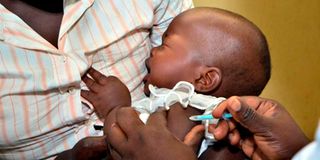Malaria vaccine for children a major breakthrough say doctors

Seven-month-old Queensly Harriet receives her second dose of the malaria vaccine at Got Agulu Sub-County Hospital in Homa Bay County on April 16.
Doctors in Kenya have welcomed The World Health Organization (WHO) recommendations on the widespread use of the malaria vaccine among children in the country.
Apart from Kenya other sub-Saharan Africa with moderate to high plasmodium falciparum malaria transmission include Ghana and Malawi.
In 2019, 858 deaths from malaria were reported in Kenya and about five million cases of malaria were confirmed in Kenya that same year.
The disease is one of the main health issues in the country.
There are an estimated 3.5 million new clinical cases and 10,700 deaths each year, and those living in Western Kenya have an especially high risk of malaria.
"This is a welcome development as it will save the lives of thousands of children who die before attaining the age of five annually in Kenya," said Dr Victor Achoka.
Sensitisation campaign
Dr Achoka said the next crucial step is for the government to step up a sensitisation campaign to ensure all children are injected with the vaccine particularly those who are born at home.
"We still have many mothers giving birth at home in rural areas and other informal settlements in urban areas and chances are that they might miss out on this life-saving vaccine," said Dr Achoka.
WHO has piloted a vaccination programme that has immunised more than 800 000 children since 2019.
Trials have shown it cuts cases of malaria by 40 per cent and those of severe malaria by 30 per cent.
However, it requires four doses and further boost shots may be required as immunity wanes over time.
It is much less effective than other childhood vaccines but doctors say that even a partially protected malaria jab has potential to save many lives.
This is the first ever vaccine for human parasite and demonstrates that a vaccine is possible for this challenging infection.
While doctors are excited by the recent development, they maintain malaria parasite is a formidable form and major battles remain.
Anti-malaria treatment
Scientists are working on more effective malaria vaccines which are in the pipeline including one developed by Oxford University, bed nets, insecticides and anti-malaria treatment will also continue to play a crucial role in tackling this ancient scourge which despite the positive news is far from being defeated.
According to WHO 95 per cent of the children dying from malaria are in sub-Saharan Africa.
At least every year 250,000 children in sub-Saharan Africa under the age of five die from malaria which translates to one child every two minutes.
"This is a historic moment. The long-awaited malaria vaccine for children is a breakthrough for science, child health and malaria control," said WHO Director-General Dr Tedros Adhanom Ghebreyesus.
"Using this vaccine on top of existing tools to prevent malaria could save tens of thousands of young lives each year."
Malaria remains a primary cause of childhood illness and death in sub-Saharan Africa. More than 260 000 African children under the age of five die from malaria annually.
In recent years, WHO and its partners have been reporting a stagnation in progress against the deadly disease.
"For centuries, malaria has stalked sub-Saharan Africa, causing immense personal suffering," said Dr Matshidiso Moeti, WHO Regional Director for Africa.
"We have long hoped for an effective malaria vaccine and now for the first time, we have such a vaccine recommended for widespread use. Today's recommendation offers a glimmer of hope for the continent which shoulders the heaviest burden of the disease and we expect many more African children to be protected from malaria and grow into healthy adults."
Malaria control
WHO recommendation for the malaria vaccine is based on the advice of two WHO global advisory bodies, one for immunisation and the other for malaria.
WHO recommends that in the context of comprehensive malaria control the malaria vaccine be used for the prevention of plasmodium falciparum malaria in children living in regions with moderate to high transmission as defined by WHO.
Malaria vaccine should be provided in a schedule of four doses in children from five months of age for the reduction of malaria disease and burden.
The key findings of the pilots were informed the recommendation based on data and insights generated from two years of vaccination in child health clinics in the three pilot countries where more than 2.3 million doses of the vaccine have been administered.
Data from the pilot programme showed that more than two-thirds of children in the three countries who are not sleeping under a bed net are benefitting from the vaccine.
Financing for the pilot programme was mobilized through collaboration among three key global health funding bodies: Gavi, the Vaccine Alliance, the Global Fund to Fight AIDS, Tuberculosis and Malaria and Unitaid, a global health initiative that works with partners to bring about innovations to prevent, diagnose and treat major diseases in low- and middle-income countries.





